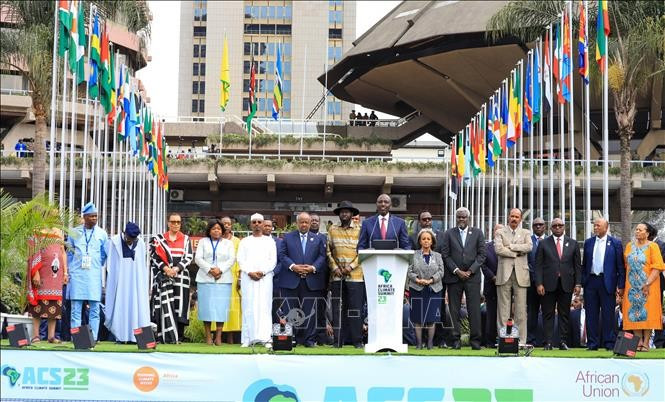With the ambition to make an essential contribution to the global solution to climate change response, African countries urged the international community to support the continent in promoting renewable energy and asked for a comprehensive change in the global financial system, to help poor countries in this climate battle.
Africa’s first climate summit was launched in Kenya’s capital of Nairobi, to find the region’s consensus ahead of upcoming global conferences and discuss funding priorities for the environment amid urgent climate-related issues.
African leaders delivered the message that it is time for the continent to be a destination for climate investment, not just a victim of floods, droughts and famines. Environment ministers, business executives and climate campaigners discussed how to scale climate finance and carbon markets, to adapt to rising temperatures and transform the food system.
Africa is promoting market-based financing instruments such as carbon credits, to raise funding that has been slow to arrive from rich-world donors. Carbon credits allow polluters to offset their emissions by funding activities such as tree planting and renewable energy.
Africa has an advantage in the transition to green energy thanks to its young population and abundant natural and renewable resources, including the concentration of large reserves of the world’s cobalt, manganese and platinum, which are essential for electric batteries and hydrogen fuel cells. According to the International Energy Agency (IEA), Africa is home to 60% of the world’s best solar energy, but the continent still has hundreds of millions of people without electricity.
Despite a lot of potential, Africa has only attracted 2% of total global renewable energy investment, over the past decade. The continent needs an investment 10 times higher than the current level to invest in renewable energy, over the next seven years, at about 600 billion USD, to achieve the goal of increasing renewable energy production from 56 GW in 2022, to at least 300 GW by 2030.
To unleash the potential of green growth to a level that can make meaningful contributions to the decarbonisation of the global economy, African countries argue that it is necessary to expand large-scale financing to this continent. Faced with mounting debts and severe capital shortages, African countries are calling on the international community to reduce their debt burdens and reform the global financial system, to pave the way for investment in clean energy.
To increase pressure on the International Monetary Fund (IMF) and the World Bank (WB), to pave the way for climate finance and investment, during the joint statement of the summit in Kenya, African countries called for resolute implementation of necessary reforms, to create new financial structures to meet Africa’s investment needs, including debt restructuring and rescheduling. Africa needs a fair playing field to access necessary investments to unleash its potential and create more opportunities for itself.
African leaders also urged developed countries, which are the biggest emitters of greenhouse gases, to respect their commitments, including providing 100 billion USD a year for clean energy and supporting poor countries to cope with climate change. At this summit, the total capital pledged by countries to support Africa was 23 billion USD, of which, the United Arab Emirates (UAE) alone pledged 4.5 billion USD to promote Africa’s transition to clean energy.
In addition, the joint statement called on world leaders to support the proposal of a global carbon tax mechanism, including a carbon tax on fossil fuel trade, marine shipping and aviation. African countries believe that these measures once implemented globally, will help secure large-scale financing of climate-related investments and separate tax increases from pressures on geopolitics and internal politics. However, according to the IMF, there are currently more than 20 countries imposing a carbon tax, but the idea of a global carbon tax mechanism has not received much encouragement.
Reaching a climate consensus in Africa has not been easy as the continent of 1.4 billion people has seen several countries pursue a transition to renewable energy, while many others still seek to protect fossil fuel sources.
Analysts say that African countries with a voice of solidarity will create impetus for many upcoming critical international conferences, including the G20 to be taking place in India and the 28th Conference of the Parties to the United Nations Framework Convention on Climate Change (COP28) in Dubai this November.
















